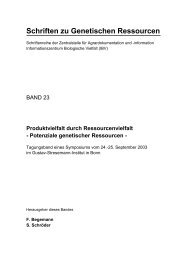Integration of Conservation Strategies of Plant Genetic ... - Genres
Integration of Conservation Strategies of Plant Genetic ... - Genres
Integration of Conservation Strategies of Plant Genetic ... - Genres
Create successful ePaper yourself
Turn your PDF publications into a flip-book with our unique Google optimized e-Paper software.
Monitoring<br />
It will be the rôle <strong>of</strong> monitoring to evaluate the results <strong>of</strong> management plans and propose changes<br />
to enhance their efficiency. Monitoring the evolution <strong>of</strong> in situ habitats and species is as essential<br />
as checking the viability <strong>of</strong> seeds in a genebank. It is the basic component <strong>of</strong> an alert system. More<br />
generally, information <strong>of</strong> all the agencies acting in the field, and training <strong>of</strong> their staff, is <strong>of</strong> utmost<br />
importance if we want to avoid unwanted or indirect destruction <strong>of</strong> protected populations. We<br />
have to remember that destruction is irreversible, whereas conservation is a permanent struggle.<br />
Low input techniques <strong>of</strong> monitoring will also prove valuable on a long term basis for fundamental<br />
studies on the evolution <strong>of</strong> populations. Researchers usually have very few opportunities to<br />
observe long term processes, due to the limited time frame <strong>of</strong> their research programs.<br />
Developing research programs<br />
I deliberately put this aspect <strong>of</strong> the strategy at the end, in order to make clear that researchers need<br />
to change their usual way <strong>of</strong> thinking. When biologists are asked to answer a conservation<br />
problem, they legitimately and regularly say that their knowledge is scarce, and that they need<br />
several years <strong>of</strong> research to establish the scientific basis <strong>of</strong> their proposals. The problem is that in<br />
most cases, the result <strong>of</strong> their research is that they discovered new fascinating problems, and that<br />
they need another research program to ascertain their findings. A lot <strong>of</strong> problems arise from this<br />
difference <strong>of</strong> approach : the job <strong>of</strong> researchers is to find new questions, whereas the job <strong>of</strong><br />
managers is to obtain better answers.<br />
The necessary dialogue with a large array <strong>of</strong> land managers<br />
Perhaps it is necessary here to enumerate the incredible diversity <strong>of</strong> people and agencies who play<br />
a rôle in land management, and could participate in a global strategy. Most <strong>of</strong> the time, this<br />
diversity is largely underestimated, and people believe that a small group <strong>of</strong> specialists would be<br />
enough to reach a satisfactory conservation strategy. This belief fails to recognise that in the real<br />
world, no funding source will be enough to meet the multifacetted challenges <strong>of</strong> conservation, and<br />
that on a long term basis, no strategy will prove viable if we don't reach the support <strong>of</strong> public<br />
opinion and mainstream society.<br />
Protected areas<br />
The network <strong>of</strong> protected areas will <strong>of</strong> course form the core <strong>of</strong> any in situ conservation system,<br />
as it is their primary objective. According to countries, we find national parks, regional parks,<br />
natural reserves. We must add national or regional trusts, such as the Conservatoire du Littoral<br />
in France, the mandate <strong>of</strong> which is to buy coastal areas and ensure their ecological management.<br />
NGO's may also be very effective in creating private trusts ; in this last case, motivations are very<br />
diverse : the aim will be to protect a spectacular landscape, or the surroundings <strong>of</strong> an architectural<br />
or historical complex, or a particular target species.<br />
Legal persons having an interest in biodiversity<br />
Forestry agencies and hunting and fishing agencies or syndicates may play a significant role. They<br />
control or manage very large areas <strong>of</strong> natural habitats, and are interested in maintaining the global<br />
functioning <strong>of</strong> ecosystems, as the life base <strong>of</strong> the species <strong>of</strong> their mandate. In particular, foresters










